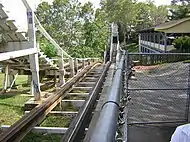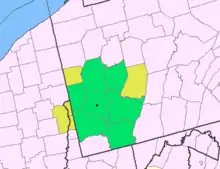| Jack Rabbit | |
|---|---|
 | |
| Kennywood | |
| Coordinates | 40°23′12″N 79°51′46″W / 40.38667°N 79.86278°W |
| Status | Operating |
| Opening date | 1920 |
| Cost | $50,000 USD |
Kennywood Park | |
| Location | 4800 Kennywood Blvd., West Mifflin, Pennsylvania |
| Area | 40 acres (16 ha) |
| Built | 1898 |
| Architect | Davidson,George S. |
| NRHP reference No. | 87000824[1] |
| Added to NRHP | February 27, 1987 |
| General statistics | |
| Type | Wood |
| Manufacturer | Harry C. Baker |
| Designer | John A. Miller |
| Track layout | Terrain, Out and Back roller coaster |
| Lift/launch system | Chain lift hill |
| Height | 40 ft (12 m) |
| Drop | 70 ft (21 m) |
| Length | 2,132 ft (650 m) |
| Speed | 45 mph (72 km/h) |
| Inversions | 0 |
| Duration | 1:36 |
| Max vertical angle | 45° |
| Height restriction | 42 in (107 cm) |
| Trains | 3 trains with 3 cars. Riders are arranged 2 across in 3 rows for a total of 18 riders per train. |
| Jack Rabbit at RCDB | |
Jack Rabbit is a wooden roller coaster located at Kennywood Park near Pittsburgh in West Mifflin, Pennsylvania. Designed and built by John A. Miller[2] and Harry C. Baker,[3] Jack Rabbit opened in 1920, making it one of the oldest roller coasters in the world still in operation.[4] The ride's three trains were manufactured by Edward Vettel, Sr. in 1951 and contain three cars of six seats each. The aging cars are considered a part of the ride's nostalgic experience but also lead to some young children being disallowed to enter the ride (42” is the minimum), due to the use of a small lap bar to hold in riders. A popular early feature of the ride was a tunnel which covered the turnaround section after the first drop, but this was removed in 1947 when the new cars were ordered. In 1991, the tunnel was restored, at a slightly shorter length.
The Jack Rabbit was built shortly after Miller patented a new track design in 1920 (which all wooden coasters built since have used). This design involved the use of wheels both under and over the track, which allowed Miller to create the then enormous 70-foot (21 m) drop that is the attraction's largest. It is most well known for its double dip element following the lift hill. The double dip produces strong airtime that makes the rider feel that they will be thrown from the seat, and a feeling that the train leaves the track (it rises up but the upstop wheels keep it firmly on the rails).
According to Rick Sebak, producer of Pittsburgh history programs for WQED, the layout and train design results in the rear seat of each train experiencing the greatest amount of airtime.
In 2019, Kennywood released a video of the Jack Rabbit, likely from 1920, on their YouTube channel. The video features clips of people on the ride and clips taken from the front row seat of the Jack Rabbit. Kennywood claims their video is "the oldest coaster POV video in the world".[5]
Awards
The nonprofit organization American Coaster Enthusiasts (ACE) designated Jack Rabbit as a Coaster Classic.[6] The ACE also designated Jack Rabbit as an "ACE Roller Coaster Landmark" in June 2010.[7] It is also a contributing structure to the Kennywood Park historic district, listed on the National Register of Historic Places.[8]
| Year | 1998 | 1999 | 2001 | 2002 | 2003 | 2004 | 2005 | 2006 | 2007 | 2008 | 2009 | 2010 | 2011 | 2012 | 2013 | 2014 | 2015 | 2016 | 2017 | 2018 | 2019 | 2022 | 2023 |
|---|---|---|---|---|---|---|---|---|---|---|---|---|---|---|---|---|---|---|---|---|---|---|---|
| Ranking | 20[9] | 22[10] | 36[11] | 37[12] | 42[13] | 34[14] | 28[15] | 37[16] | 33[17] | 34[18] | 39[19] | 20[20] | 23[21] | 16[22] | 18[23] | 19[24] | 21[25] | 20[26] | 26[27] | 20[28] | 20[29] | 12[30] | 15[31] |
Gallery
 The orange train after departing the station.
The orange train after departing the station. The pink train begins its descent down the double dip. This train has since been repainted orange as seen in the other photos.
The pink train begins its descent down the double dip. This train has since been repainted orange as seen in the other photos. The double dip, the Jack Rabbit's signature element, as seen from the queue at left along with the ride's first drop next to it.
The double dip, the Jack Rabbit's signature element, as seen from the queue at left along with the ride's first drop next to it. The orange train loading in the station.
The orange train loading in the station.
References
- ↑ "National Register Information System". National Register of Historic Places. National Park Service. November 2, 2013.
- ↑ Marden, Duane. "Jack Rabbit (Kennywood)". Roller Coaster DataBase.
- ↑ Miller and Baker Inc. 1923 Catalogue (reprint). Natrona Heights, PA: Amusement Park Journal. 1923.
- ↑ "World's Oldest Operating Roller Coasters". National Amusement Park Historical Association. Retrieved November 19, 2019.
- ↑ Kennywood Jack Rabbit The World's Oldest Coaster POV!, archived from the original on 2021-12-21, retrieved 2021-05-25
- ↑ "ACE Coaster Classic Awards". Archived from the original on 2015-09-08. Retrieved 2008-02-21.
- ↑ "Coaster Landmark Awards - Jack Rabbit". www.aceonline.org.
- ↑ Kennywood Park (Kenny's Grove) (Report). National Register of Historic Places, National Park Service. February 27, 1987. p. 5.
- ↑ "Top 25 wood Roller Coasters" (PDF). Amusement Today: 6B. August 1998. Retrieved September 13, 2016.
- ↑ "Top 25 wood Roller Coasters" (PDF). Amusement Today: 6B. August 1999. Retrieved September 13, 2016.
- ↑ "Top 25 wood Roller Coasters" (PDF). Amusement Today: 6B. August 2001. Archived from the original (PDF) on October 19, 2013. Retrieved September 13, 2016.
- ↑ "Top 25 wood Roller Coasters" (PDF). Amusement Today: 6B. September 2002. Archived from the original (PDF) on October 19, 2013. Retrieved September 13, 2016.
- ↑ "Top 50 wood Roller Coasters" (PDF). Amusement Today: 10–11B. September 2003. Archived from the original (PDF) on October 19, 2013. Retrieved September 13, 2016.
- ↑ "Top 50 wood Roller Coasters" (PDF). Amusement Today: 14–15B. September 2004. Archived from the original (PDF) on April 3, 2007. Retrieved September 13, 2016.
- ↑ "Top 50 wood Roller Coasters" (PDF). Amusement Today: 22–23B. September 2005. Archived from the original (PDF) on October 19, 2013. Retrieved September 13, 2016.
- ↑ "Top 50 wood Roller Coasters" (PDF). Amusement Today: 30–31B. September 2006. Archived from the original (PDF) on October 19, 2013. Retrieved September 13, 2016.
- ↑ "Top 50 wood Roller Coasters" (PDF). Amusement Today. 11 (6.2): 42–43. September 2007. Archived from the original (PDF) on October 19, 2013. Retrieved September 13, 2016.
- ↑ "Top 50 wood Roller Coasters" (PDF). Amusement Today. 12 (6.2): 42–43. September 2008. Archived from the original (PDF) on October 19, 2013. Retrieved September 13, 2016.
- ↑ "Top 50 wood Roller Coasters" (PDF). Amusement Today. 13 (6.2): 38–39. September 2009. Archived from the original (PDF) on October 19, 2013. Retrieved September 13, 2016.
- ↑ "Top 50 wood Roller Coasters" (PDF). Amusement Today. 14 (6.2): 38–39. September 2010. Archived from the original (PDF) on October 19, 2013. Retrieved September 13, 2016.
- ↑ "Top 50 wood Roller Coasters" (PDF). Amusement Today. 15 (6.2): 46–47. September 2011. Archived from the original (PDF) on October 19, 2013. Retrieved September 13, 2016.
- ↑ "Top 50 wood Roller Coasters" (PDF). Amusement Today. 16 (6.2): 46–47. September 2012. Retrieved September 13, 2016.
- ↑ "2013 Top 50 wood Roller Coasters" (PDF). Amusement Today. 17 (6.2): 40–41. September 2013. Archived from the original (PDF) on October 19, 2013. Retrieved September 13, 2016.
- ↑ "2014 Top 50 wood Roller Coasters" (PDF). Amusement Today. 18 (6.2): 38–39. September 2014. Retrieved September 13, 2016.
- ↑ "2015 Top 50 wood Roller Coasters" (PDF). Amusement Today. 19 (6.2): 45–46. September 2015. Retrieved September 13, 2016.
- ↑ "2016 Top 50 Wooden Coasters". Golden Ticket Awards. Amusement Today. September 2016. Retrieved September 13, 2016.
- ↑ "2017 Top 50 Wooden Coasters". Golden Ticket Awards. Amusement Today. September 2017. Retrieved September 13, 2016.
- ↑ "2018 Top 50 Wooden Coasters". Golden Ticket Awards. Amusement Today. September 2018. Retrieved September 13, 2016.
- ↑ "2019 Top 50 Wood Coasters". Golden Ticket Awards. Amusement Today. September 2019. Retrieved September 13, 2016.
- ↑ "2022 Golden Ticket Award Winners". Golden Ticket Awards. Amusement Today. September 2022. Archived from the original on September 12, 2022. Retrieved September 13, 2016.
- ↑ "2023 Golden Ticket Award Winners". Amusement Today. 27 (6.2): 71–72. September 2023. Archived from the original on September 10, 2023. Retrieved September 13, 2016.
